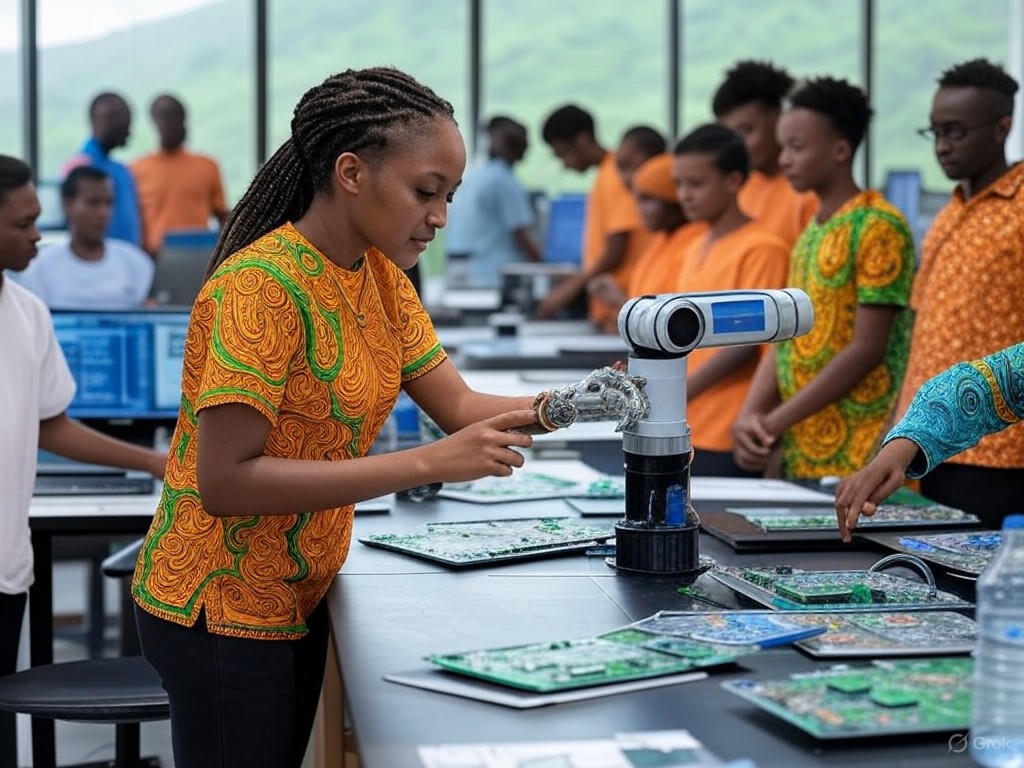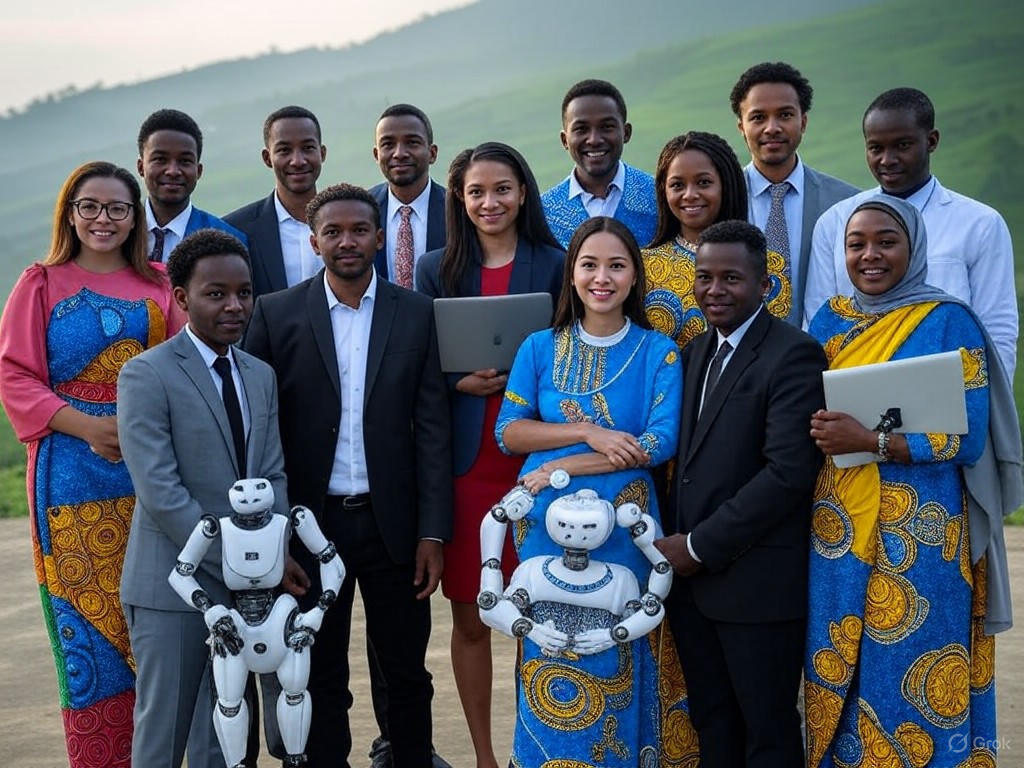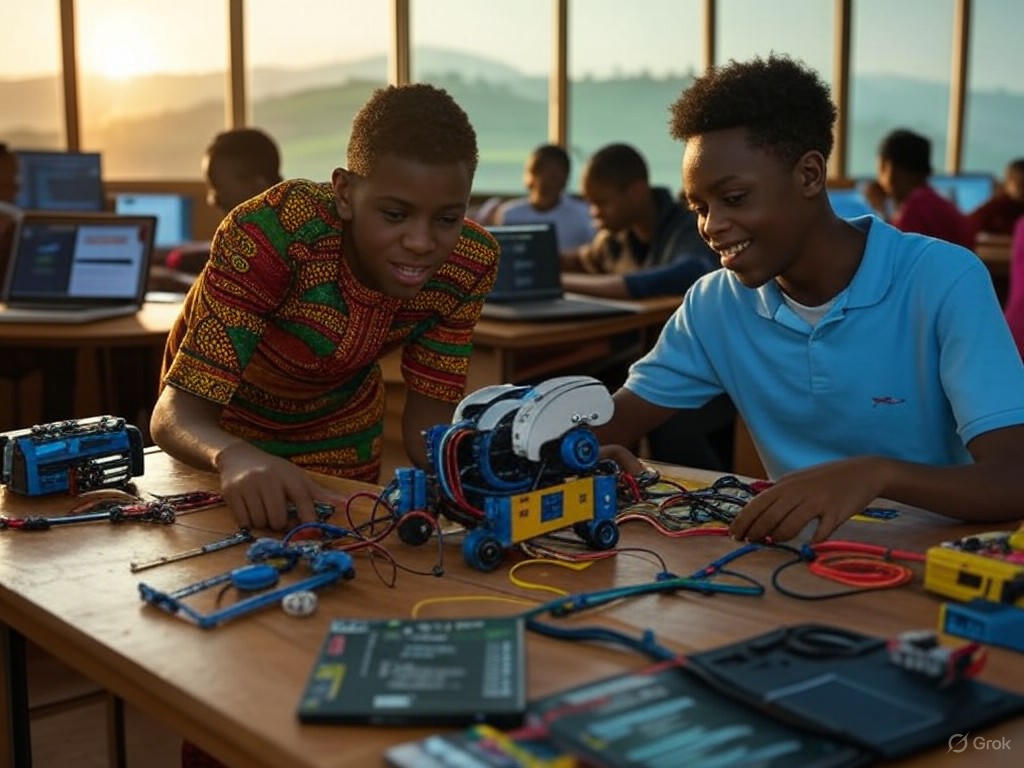STEM Education in Rwanda: Tech Futures
In the mist-shrouded hills of Rwanda, where ancient landscapes whisper tales of resilience, a quiet revolution unfolds—not through grand governmental decrees, but through the steady hum of innovation and individual endeavor. As refugees from across the region seek refuge in this East African nation, Rwanda's burgeoning STEM (science, technology, engineering, and mathematics) education initiatives stand as a testament to the power of self-reliance and market-driven progress. These programs, often forged through partnerships between local entrepreneurs and international private entities, equip young minds with the tools to navigate a tech-driven future. Yet, in an era of rapid change, we must reflect on whether such efforts truly empower individuals or merely echo the promises of overreaching intervention. From a center-right lens, the answer lies in fostering free-market principles and traditional values of hard work and community, allowing personal initiative to flourish without the heavy hand of expansive government control.
Rwanda's journey in STEM education for refugees is not merely a policy; it is a narrative of human potential, woven into the fabric of a nation rebuilding from turmoil. Since the early 2010s, initiatives like the Kigali Innovation City and various tech hubs have targeted displaced youth, offering training in coding, robotics, and digital literacy. These efforts emphasize empowerment through practical skills, preparing participants for roles in the global tech economy rather than relying on perpetual aid. Here, the focus is on individual agency: refugees are not passive recipients but active contributors, learning to innovate in fields that demand creativity and discipline. This approach aligns with traditional values of self-sufficiency, echoing the pioneer spirit that once defined frontier societies, where personal ingenuity, not bureaucratic oversight, paved the way for progress.

Young refugees collaborating on a robotics project in a Kigali tech hub, symbolizing the fusion of tradition and innovation.
The Analysis: Market Forces as Catalysts for Empowerment
At the heart of Rwanda's STEM initiatives is a model that privileges free-market dynamics over centralized planning. Unlike expansive government programs that might burden taxpayers with unsustainable subsidies, these efforts often leverage public-private partnerships, where private firms invest in education as a pathway to future talent pools. For instance, collaborations with companies like Andela, a tech talent accelerator, have trained thousands of young Africans, including refugees, in software development. This not only addresses immediate skill gaps but also creates a pipeline for employment in the global market, fostering economic independence without fostering dependency on state support.
This market-oriented approach reflects a deeper introspection on the role of government: it sets the stage by providing basic infrastructure, such as the fiber-optic networks rolled out under Rwanda's National Strategy for Transformation, but steps back to let private innovation take the lead. In doing so, it avoids the pitfalls of overregulation, which can stifle creativity and individual ambition. From a center-right perspective, this balance honors traditional values of community and personal responsibility, where education serves as a bridge to opportunity rather than a tool for social engineering. Refugees, often hailing from regions marred by conflict, find in these programs a chance to reclaim agency, transforming challenges into stepping stones through disciplined effort and entrepreneurial spirit.
Yet, for all its merits, this model is not without scrutiny. Critics argue that without sufficient government oversight, access to these programs might remain uneven, potentially excluding the most vulnerable. However, a balanced view recognizes that true empowerment stems from voluntary participation and market incentives, not mandates. As The Wall Street Journal aptly notes, Rwanda's tech ecosystem thrives because it attracts private investment, which in turn creates jobs and skills training organically. This dynamic underscores the efficacy of limited government intervention, allowing resources to flow where they are most needed based on demand, rather than top-down allocation.
Evidence of Impact: Stories and Data from the Field
The evidence supporting Rwanda's STEM initiatives is both compelling and rooted in real-world outcomes, drawing from a tapestry of reports and on-the-ground successes. Consider the data from the Rwanda Education Board, which indicates that STEM enrollment among refugee youth has surged by over 40% in the past five years, correlating with a rise in tech-related employment opportunities. Programs like the Mastercard Foundation's initiatives, which partner with local universities to offer scholarships and apprenticeships, have seen graduates securing positions at international firms, thereby contributing to Rwanda's GDP growth in the tech sector.
One illustrative example is the Agahozo-Shalom Youth Village, a haven for orphaned and displaced youth, where STEM curricula integrate with vocational training. Here, students engage in projects that blend technology with sustainable agriculture, such as developing apps for crop monitoring. This not only equips them for tech-driven futures but also instills values of hard work and community stewardship—cornerstones of traditional societies. As IEEE Spectrum reports, such integrations have led to a 25% increase in female participation in STEM fields, highlighting how market-responsive education can address gender dynamics without resorting to quotas or ideological framing.
Further bolstering this narrative is the role of international collaborations, as detailed in a World Bank blog. The blog outlines how foreign direct investment in Rwanda's tech hubs has doubled since 2018, driven by the allure of a skilled workforce. This influx of private capital, rather than government aid, has empowered refugees to launch startups, with over 150 new tech ventures emerging in the last three years. Such developments underscore the center-right principle that free markets, when unencumbered, can uplift communities more effectively than expansive welfare systems.

Refugee students celebrating their graduation from a STEM program, embodying the spirit of self-made success in Kigali.
In contrast, regions overly reliant on government-led education reforms often grapple with inefficiencies, as evidenced by comparative studies. For instance, while neighboring countries pour resources into state-controlled programs, Rwanda's lean approach yields higher retention rates and employability, per Brookings Institution analysis. This evidence reinforces the idea that empowerment flourishes in environments where individuals are encouraged to innovate independently, drawing on innate talents and market opportunities.
Conclusion: A Reflective Path Forward
As the sun sets over Rwanda's verdant hills, casting long shadows that mirror the introspective journey of its youth, we are reminded that true empowerment is not bestowed but earned. Rwanda's STEM education initiatives for refugees exemplify how free-market principles and limited government intervention can ignite personal growth, blending technology with the timeless values of diligence and community. By prioritizing private partnerships and individual initiative, these programs offer a model that other nations might emulate, steering clear of the excesses that come with overregulation.
In this quiet revolution, we see not just the empowerment of minds through STEM, but a broader affirmation of human resilience. It is a poetic reminder that, in the vast expanse of progress, the seeds of innovation bloom best in soil tilled by self-reliance. As we look to the future, let us advocate for policies that nurture this spirit, ensuring that education remains a ladder of opportunity, not a crutch of dependency. Through such measured steps, Rwanda's story becomes a beacon, illuminating the path for a world where technology and tradition walk hand in hand.

